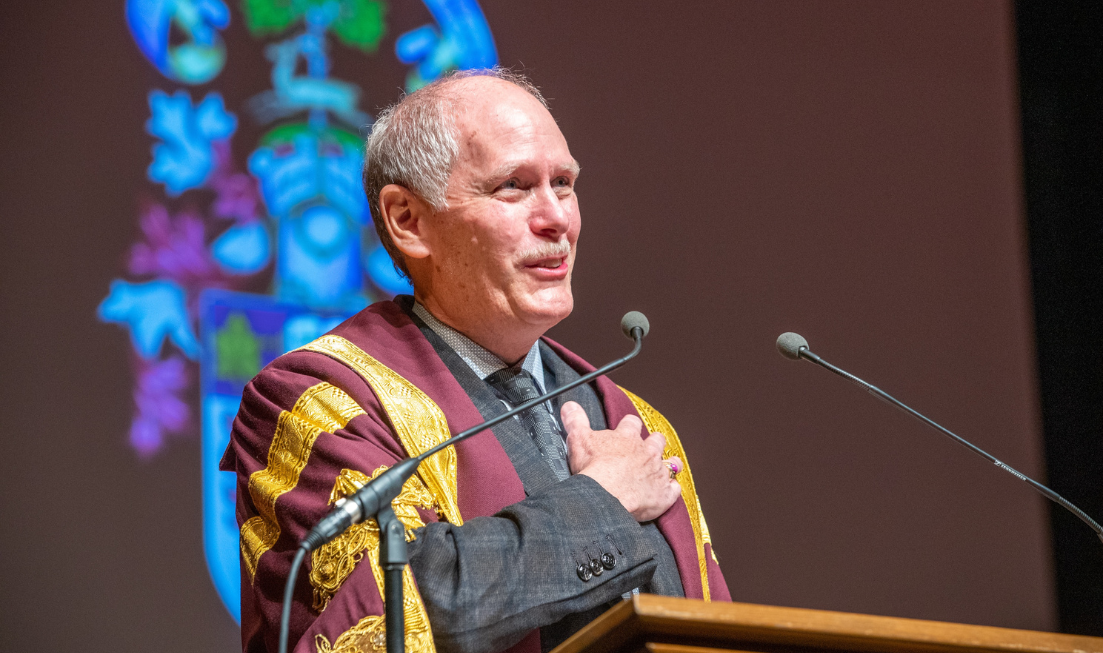A farewell message from President David Farrar

The exceptional McMaster community — our extraordinary students, faculty and staff — is the reason that our university’s future remains strong, writes President David Farrar. (Georgia Kirkos, McMaster University)
As I come to the end of my time as president, I feel immense gratitude for the support I have received from the remarkable community of faculty, staff and students at McMaster, whose contributions have allowed us to achieve enormous success.
Serving as McMaster’s president has been one of the greatest privileges of my life. Over the past five and a half years, we have not only navigated profound challenges together — we’ve transformed them into opportunities for growth, innovation and impact.
I am taking with me memories of conversations and collaborations with the most accomplished community of researchers I have ever known.
I met many of you during the pandemic crisis, as you channeled your research knowledge in service of public health guidance, vaccine discovery and personal protective equipment. Our researchers are leading national and international efforts in infectious disease, including the development of an inhaled vaccine now in clinical trials.
We are advancing AI-driven drug discovery, exploring energy alternatives through Small Modular Reactor technology, and have secured major government investment in the McMaster Nuclear Reactor to scale medical isotope production.
We are improving the lives of older adults by mobilizing research and education on aging, and improving collaboration with those in the aging support communities.
We are expanding cultural knowledge through groundbreaking work to better understand the Black Death and preserving the experiences of those impacted by the Air India Flight 182 bombing.
We deepened our commitment to the health of the planet by launching McMaster’s first sustainability strategy and net-zero roadmap, began installing geothermal infrastructure, and are working with Indigenous and community partners to protect the Cootes to Escarpment EcoPark.
We are leading the world in research on transportation electrification and smart mobility, as well as the integration of sustainable energy sources to determine a “best mix” approach to energy generation.
To bring our research to the communities that need it the most, we strengthened McMaster’s innovation ecosystem –– introducing new programs in biomedical innovation and entrepreneurship, the McMaster Seed Fund, and the Entrepreneurship Academy. This ecosystem helped support McMaster’s first unicorn, Fusion Pharmaceuticals, which was acquired by AstraZeneca last year.
These accomplishments are the tip of the iceberg; there are remarkable discoveries and brilliant teaching happening in every corner of McMaster University.
In the winter of 2020, I walked the empty and snowy campus almost every day, which reinforced a truth I have always known: students are the heart and soul of a university.
I am taking with me insights gained from hundreds of conversations with remarkable students, who are already changing our community and our world in significant ways. I will carry with me memories of stunning performances by student choirs and student bands and ensembles, as well as the thrilling efforts of our student athletes.
To support the achievements of our diverse community of students and scholars, we have moved our university forward in important and enduring ways:
We launched the Black Student Success Centre, and created new mentorship and hiring initiatives for Black students, faculty and researchers. We advanced McMaster’s commitment to Truth and Reconciliation with the establishment of the Indigenous Studies Department, an Indigenous student bursary, and the creation of the role of first vice-provost, Indigenous.
We embraced new ways of teaching and learning, by supporting the responsible use of AI in the classroom and expanded hands-on learning. This fall, the Wilson College of Leadership and Civic Engagement, a unique program offering students the opportunity to develop their skills to serve as future leaders, will welcome its first undergraduate cohort.
And the campus has changed in more tangible ways. In addition to the new Peter George Centre for Living and Learning, the McMaster Learning and Discovery Greenhouse, and the Graduate Student Residence on Bay, we are nearing the completion of the McLean Centre for Collaborative Discovery and seeing great progress on Lincoln Alexander Hall.
None of this would have been possible without the vision and commitment of faculty, staff and students across McMaster.
As we prepare for transition on July 1, I believe the university has built a strong foundation that will enable McMaster, under the leadership of incoming president Susan Tighe, to explore new opportunities and achieve even greater success.
It is because of this exceptional McMaster community that the university’s future remains strong. It is because of you that we will continue to achieve the kind of impact, locally and globally, for which our university is known.
From my bench in the Department of Chemistry and Chemical Biology, I will be looking forward to what you will achieve in the years ahead. I know it will be extraordinary.
Sincerely,

David


